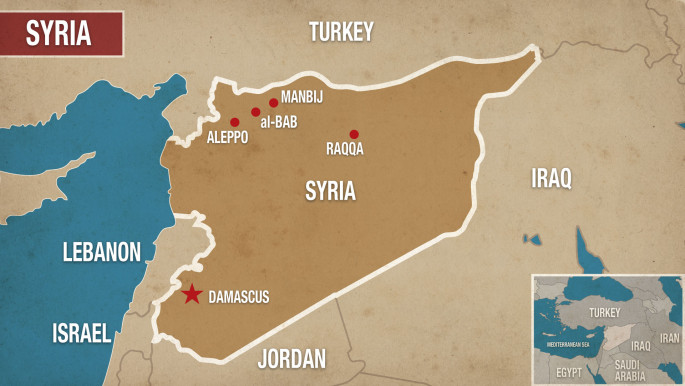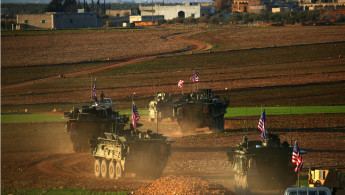US, Russia reject Turkish attempts to sideline Syrian Kurds
A meeting between the American, Russian and Turkish chiefs of staff in the Turkish city of Antalya last week resulted in Turkey's envoy failing to convince his counterparts that Ankara, not Syrian Kurdish-led forces, should capture the city of Raqqa from Islamic State group militants.
Turkey has long argued that Washington's policy of supporting the Syrian Kurdish People's Protection Units (YPG) - the main group within the Syrian Democratic Forces (SDF) Arab-Kurdish coalition - amounts to using one terrorist group against another.
Ankara suggested that Washington should work with them to separate the Arab elements of the SDF from the Kurdish YPG, and combine them with the Free Syrian Army (FSA) fighters Turkey has used as proxies against IS.
Turkish officials want that new fighting force to then march on Raqqa.
The Raqqa offensive is already relying heavily on Arab SDF fighters over Kurdish YPG ones, with the Kurds playing a supporting role, rather than leading the fight. One salient reason the SDF was formed back in October 2015 was to mitigate any ethnic tensions which might arise from the Kurdish YPG entering Arab territory to remove IS.
Another flaw in Turkey's plan is the fact these Turkish-backed FSA militiamen have proven less capable and battle-hardened than the SDF/YPG. They failed to capture al-Bab, a much smaller city than Raqqa, until a large number of Turkish troops were sent in to reinforce them. This demonstrated their shortcomings as a proxy force deployed in lieu of a large and overt Turkish ground presence in Syria.
This precedent certainly wasn't likely to give the Americans serious pause to consider entirely overhauling their current strategy, which is making tangible progress.
Since Turkey launched its incursion into Syria last August, it was clear that its main motivation was blocking the SDF and the YPG from continually expanding westwards from Manbij - which they had captured completely from IS by the end of August 2016. The Kurdish militia intended to rout IS in al-Bab and Jarablus to establish a corridor to other territory held by Kurdish groups in Afrin in the process, Ankara argued.
 |
Numan Kurtulmus... pointed out that capturing al-Bab essentially fulfilled all the operational objectives of the Turkish intervention: IS is no longer anywhere on the Turkish border and the Syrian Kurds are now blocked from linking up their territories |  |
Similarly, Ankara's claims that it is better suited for the Raqqa operation is overwhelmingly, if not entirely, motivated by a desire to contain and sideline the SDF and YPG.
Turkey's Deputy Prime Minister Numan Kurtulmus notably contradicted Turkish President Recep Tayyip Erdogan last month when he pointed out that capturing al-Bab essentially fulfilled all the operational objectives of the Turkish intervention: IS is no longer anywhere on the Turkish border and the Syrian Kurds are now blocked from linking up their territories.
For months, Turkish officials, foremost among them President Erdogan, said the Turkish army would march on Raqqa after capturing Manbij. Following the capture of al-Bab from IS, Turkish-backed Syrian militiamen clashed with SDF forces there, prompting the US to send in more than 100 Army Rangers in armoured vehicles to prevent the clashes from escalating.
Russian forces are also present in that city. Moscow brokered a deal earlier this month whereby western Manbij was handed over by the SDF to Syrian regime troops, effectively placing a buffer between them and the Turks.
The YPG, meanwhile, announced this week that Russian troops were being deployed to Afrin to train their forces. Russia disputes this, claiming they are merely setting up another reconciliation center to monitor truces. Either way, any overt Russian deployment in or around Afrin could be an obstacle to any potential move by Turkey, or its proxies, to attack that small isolated Kurdish canton.
 |
Turkey cannot afford to alienate Russia again. It successfully patched up ties after they infamous November 2015 downing of a Russian aircraft over their border. Were it not for Moscow, the Syrian regime would likely more forcible oppose Turkey's intervention in Syria.
It was Turkish bombing of YPG fighters last November that led the Syrians to threaten to shoot down Turkish jet fighters, a threat Ankara evidently took seriously since it held back air support of its ground forces for a week until Moscow convinced Damascus to relent.
Now, with the IS threat largely removed from northwest Syria, the Russians see less reason to give diplomatic cover to Ankara's continued presence. It is rumoured that in the aforementioned Antalya meeting that Russian Chief of Armed Forces Staff General Valery Gerasimov politely suggested to his Turkish counterpart, Hulusi Akar, that it was time for Turkey to withdraw from Syria.
It's not clear exactly what he said, however, if the Turks remain and focus on confronting the Kurds militarily, Russia is likely to oppose them.
Aside from taking the M4 Aleppo-Raqqa Highway through Manbij the only other way Turkish ground forces could feasible head to Raqqa would be south through the northeast border city of Tal Abyad.
 |
Moscow and Washington do not want to see a confrontation between Turkey and the SDF/YPG |  |
Tal Abyad - known to Kurds as Gire Spi - was captured by the YPG in July 2015, through which they connected their primary cantons of Kobane and Jazira. As in Manbij, the US stars and stripes has been spotted conspicuously flying over Tal Abyad - a clear signal to the Turks not to forcibly enter the area.
These moves clearly demonstrate that Moscow and Washington do not want to see a confrontation between Turkey and the SDF/YPG.
Such a confrontation could affect the SDF operation against Raqqa, something Washington doesn't want for obvious reasons. As of writing the city is completely surrounded and "isolated" by the SDF. The YPG told Reuters that offensive operations into the city would begin in early April. Washington cannot risking seeing this compromised.
Turkish Defense Minister Fikri Isik said his country wants a diplomatic solution to the Manbij standoff negotiated with the US and Russia. The US has already said its deployment of Army Rangers in Manbij would enable them to ensure that there are no YPG elements remaining in the city, only Arab SDF fighters.
Manbij, despite the impasse and repeated Turkish threats against it, might actually provide a model for how the US could deal with Turkish concerns vis-a-vis the YPG in Raqqa. The Americans convinced the Turks to allow the YPG westward of the Euphrates River - which had long been a "red-line" for the Turks - as part of a larger Arab-majority SDF expeditionary force which captured Manbij last summer.
As part of the deal, Washington assured the Turks that the YPG would immediately return home after Manbij's capture from IS. The Turks aren't convinced the YPG have fully withdrawn. The Obama administration even threatened to stop supporting the YPG if they did not adhere to the deal.
The Americans could draft a similar agreement concerning Raqqa, which would reasonably placate Turkey's concerns about the YPG attaining anything resembling a permanent foothold there. By doing this they can diplomatically discard Ankara's latest proposal, which they likely recognise had much more to do with sidelining the YPG than devising an effective and efficient strategy to force IS from its primary Syrian stronghold.
Follow him on Twitter: @pauliddon


![Minnesota Tim Walz is working to court Muslim voters. [Getty]](/sites/default/files/styles/image_684x385/public/2169747529.jpeg?h=a5f2f23a&itok=b63Wif2V)






